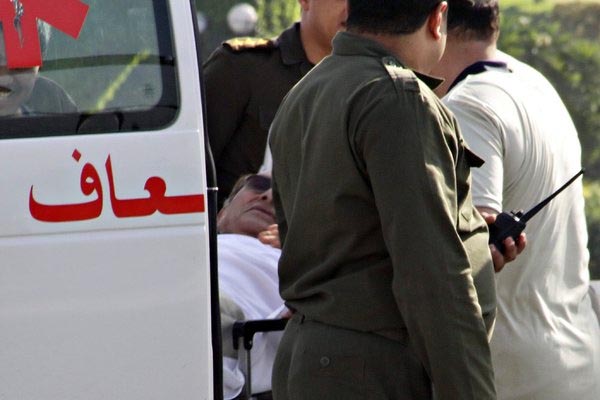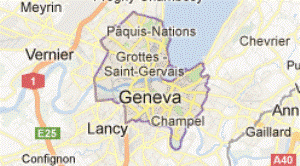AFRICA
Egypt: The Revolution At The Crossroads
August 23, 2013 · 0 Comments
Source: Campaign for Peace and Democracy

Above: Mubarak leaves prison, August 22, 2013 (Credit: Reuters).
By Thomas Harrison:
As I write, a horrible tragedy is unfolding in Egypt. The old order has reasserted itself with a vengeance. Nevertheless, it is hard to imagine that Egypt will ever again be what it was before 2011.
Many aspects of the situation remain murky. First, there is the question of how many of Morsi's supporters have been slaughtered. The New York Times accepts the figure of 1,000, with 4,000 wounded (this includes a relatively small number of police and army, as well as anti-Muslim Brotherhood civilians) in the initial attack on the protest camps and during the four or five days afterwards. We may never know the true casualty figures, but there is good reason to believe that they are much higher than this. Certainly the number of deaths will continue to rise if Egypt descends into civil war, which seems to be happening.
Then there is the question of Washington's role. According to reporting in the Times, American and European diplomats tried to broker a deal between the SCAF (Supreme Council of the Armed Forces) and the Brotherhood in order to prevent the massacre, but the military "brushed them off." At the same time, Israel, the Saudis and the United Arab Emirates lobbied the U.S. not to pressure the Egyptian generals. Though the American ambassador in Cairo was considered to have friendly relations with Morsi, Obama made no public comments on the coup for several days, even after the army committed its first large-scale killings. Secretary of State Kerry actually praised the military for "restoring democracy." Obama condemned the butchery of August 14, but his administration bears some of the responsibility for it by having given de facto support to the July 3 coup and thus signaling to the SCAF that they might escalate the violence with impunity. Moreover, in the aftermath of August 14 it was instantly made clear that Egypt's $1.5 billion, mostly in military aid, would not be in jeopardy no matter what the army did – although under pressure (from Republicans, mostly) Obama is now hinting at some reductions in subventions to Egypt.
It is a scandal that the fight to cut off U.S. aid to this murderous regime is being led by elements on the right, like Robert Kagan, even though most of them, such as John McCain and Lindsey Graham, call only for its temporary "suspension." Earlier, on July 31, a Senate attempt to block military aid, led by Rand Paul, was defeated 86-13, after intense lobbying by AIPAC, with every Democrat voting against. Even now, among Democrats there seems to be almost no interest in a cutoff. Some have used the pathetic excuse that Egypt would always be able to get military aid from Russia, Israel or the Saudis instead (true), and "we" would thereby lose our "leverage" with Cairo. Others are simply following the AIPAC line. But for most, as usual, it comes down to a reluctance to trouble their friend in the White House.
The argument about "leverage" is largely specious because U.S. aid does offer Egypt access to some very sophisticated weaponry and maintenance contracts for its existing arsenal. The United States and Egypt have long been highly integrated at the military and diplomatic levels, and if Obama were to act in a principled way it might very well have a sobering effect on the SCAF. In fact it seems possible that if Washington had forthrightly denounced the July 3 coup and threatened to cut off aid immediately, the massacres of August 14 might have been avoided.
In any case, it is certain that none of this was considered by the Obama administration and will not be in the future unless there is a determined campaign by the peace, human rights and social justice movements. American progressives should demand the termination of aid, not only because it is immoral to supply mass murderers with weapons, but because cutting off aid to the generals would offer comfort and solidarity to the Egyptian victims of the army's repression and encourage those in the Arab and Muslim world who yearn for real democracy.
When Mubarak fell, it was generally assumed in the West that Egypt's masses were so deeply attached to Islamic conservatism that the Muslim Brotherhood would win power by a sweeping majority. That condescending view quickly proved unfounded. Morsi and the Salafist candidate together won only 42 percent in the first round of the presidential election, and Morsi himself garnered only 51 percent in the second round – a victory, but hardly a landslide, much less a popular mandate to gather all power to himself and the Muslim Brotherhood, and to impose a sharia state. But that is what Morsi proceeded to do, albeit gradually.
Juan Cole has called Morsi's presidency "a slow motion coup." In light of the current, much more repressive military regime, it is easy to forget the sectarian and anti-democratic thrust of Morsi's policies. The president quickly began to act as though he was above the law. He pushed through a new constitution, based on sharia principles, that was endorsed by a referendum in which only 30 percent of Egyptians participated; effectively a mass boycott. The new constitution made "the principles of Islamic law (sharia) the main source of legislation," as did the old constitution, but it added language that more specifically defined sharia in terms of "evidence, rules, jurisprudence and sources" accepted by Sunni Islam – suggesting that sharia-mandated punishments for theft, adultery, and blasphemy might soon be imposed. Indeed, Coptic teachers were charged with blasphemy under the constitution. All of this was far from a Taliban-style system, of course, and far less than Salafists demanded. But it was ominous, and millions of Egyptians clearly believed that worse was to come if Morsi remained in office.
Above all, Morsi was flagrantly attempting to create a one-party state, asserting the right to rule by decree, attempting to pack the courts with pro-Brotherhood judges and accusing all his critics of being part of a foreign conspiracy. Morsi's political style took on a very ugly, authoritarian and paranoid cast. Anti-Copt rhetoric, which had always been a staple of Brotherhood discourse, was strident. The police turned a blind eye to Brotherhood vigilantes who attacked Christians and Shias. Islamist gangs assaulted leftist demonstrations and imposed the jizya on Coptic communities – the tax on non-Muslims levied in the past by Islamic rulers, including the Ottomans. Morsi clamped down hard on freedom of expression, closing several newspapers and prosecuting bloggers.
Popular revulsion at these trends, including from millions who had voted for Morsi, contributed to the explosion last June. But the thing that turned most Egyptians against his rule was terrible economic hardship. Morsi unhesitatingly did the bidding of the IMF. The result was a massive increase in Egypt's already catastrophic unemployment, scarcity of food and fuel and rising prices for staples. Of course, continuing austerity and the whole neoliberal project were exactly what the Egyptian ruling class expected Morsi to impose. In return for their support or acceptance, however, he was also expected to end the revolution. Egypt's elite, including the military brass, hoped the Muslim Brotherhood's efficient machine could co-opt and neutralize the disaffected masses, but it did not, and this is what prompted the elite to abandon him.
The revolt, or Tamarod, of June 30 was complex.The Tamarod organization itself was an extremely loose alliance of youth from the Social Democratic Party, the Socialist Popular Alliance Party, Mohamed ElBaradei's Constitution Party, and the Revolutionary Socialists (RS). None of these groups, except the RS, are actually socialist or even very left; Hazem Al-Beblawi, for example, a founder of the Social Democrats, is the current prime minister. But behind the Tamarod were millions of Egyptians who wanted Morsi's ouster and prompt new elections. Some 22 million signed the Tamarod petition calling on Morsi to step down, and an estimated 17 million demonstrated in Cairo on June 30 in what may have been the largest mass demonstration in history. These figures represent around one fourth of the country's population, or about half of all Egyptian adults; a comparable number in the United States would be 78 million – more than voted for Romney or Obama. (Some have questioned these numbers, but no one, as far as I know, disputes that they were enormous and far larger even than the turnout in January 25, 2011.) In a democracy, no president is entitled to stay in office in the face of this kind of opposition. The Egyptian people, like citizens everywhere, have a moral right to recall governments that have lost their confidence, a right that for Americans is enshrined in the Declaration of Independence. Morsi should have stepped down – but then there should have been new elections as quickly as possible. This is what many, probably most, Egyptians expected, but it was not what the army planned when it stepped in to "carry out the will of the people." Nor, it seems, was this what most of the Tamarod's leaders had in mind.
Adam Shatz, writing in the London Review of Books, cited a friend with "contacts in the [Egyptian] security establishment" who claims that the coup of July 3 was coordinated with Tamarod, which provided it with populist cover. In view of the fact that Tamarod's leaders have vociferously supported Gen. Al-Sisi and are calling for vigilante attacks on the Muslim Brotherhood, there is good reason to suspect a degree of cooperation between them and the Egyptian army. Moreover, it was no secret that the movement as a whole always included supporters of the old regime and the army, who wanted to crush the Brotherhood at any cost. The bewildering aspect of all this, however, is how quickly and easily the democratic elements in Tamarod, especially the Revolutionary Socialists, were sidelined by the authoritarians.
Nevertheless, the mass outrage of the movement that culminated on June 30 was real and sprang from deep, legitimate grievances. Those millions of demonstrators were not mere pawns of the SCAF and the activists of Tamarod. Among them were workers who had seen their strikes broken and their unions throttled by the Morsi regime, women who knew that their rights were threatened, Egyptians who were disgusted by the government's encouragement of sectarianism and hatred for religious minorities, and the poor and underemployed demanding what the revolution had promised: bread, freedom and social justice. It was a tragedy of epic proportions that there was no leadership that could offer a consistently democratic perspective to the mass movement, one that clearly distinguished between a demand for Morsi's ouster and a military takeover.
What now? The SCAF is conducting a reign of terror, and their targets will be labor and human rights activists as well as Islamists. The military's ferocious attack on Egyptians' freedom already makes Morsi's authoritarianism pale in comparison. We who are outside Egypt should do everything we can to make this a pariah regime. It is imperative for the Egyptian left to defend the victims of the military's savage repression, especially those Muslim Brotherhood members and supporters protesting the coup. At the same time, there should be concerted efforts to protect Egypt's ten-million strong Coptic community against the ongoing pogroms carried out by Brotherhood and Salafist gangs. Al-Sisi's government clearly intends to ban the Brotherhood, and when and if it permits new elections these will be fatally compromised as long as the imprisonment of opposition leaders and restrictions on political freedoms continue. Morsi, the Brotherhood leaders, and all political prisoners should be released, the state of emergency lifted, and free elections held as quickly as possible.
Egypt has gone backward. The revolution has suffered a terrible defeat, and the old regime has arrogantly taken back nearly everything it had lost in 2011. The crowning insult is the possibly imminent release of Mubarak himself. What cannot be restored however, is the crippling passivity of the masses before 2011. Egyptians have seen the power of great numbers in the streets – their power. They know that it was Egypt, after Tunisia, that unleashed the magnificent Arab spring. Under the generals, Egypt is now entering a very dark time. Leaderless, disoriented, millions of Egyptians are right now under the terrible illusion that the army has "saved" them and will take care of them. They will learn, and quickly. It is impossible to believe that the darkness will last for more than a short time. We have not heard the last of the Egyptian Revolution.
Thomas Harrison is on the editorial board of New Politics and co-director of the Campaign for Peace and Democracy.
By admin









